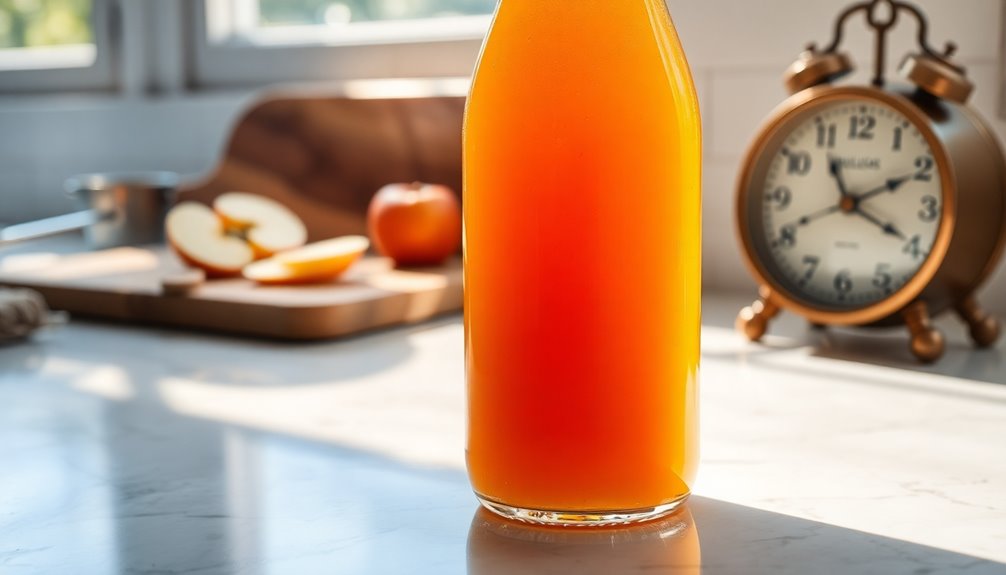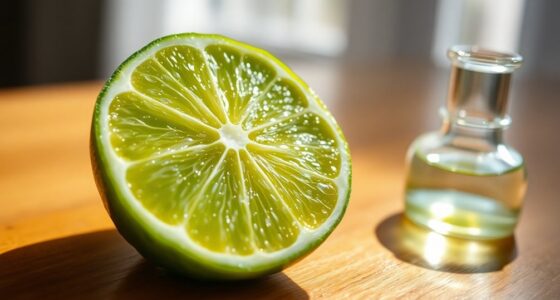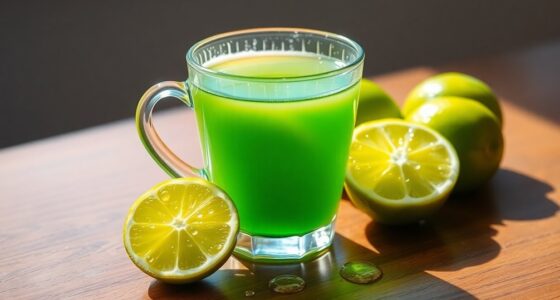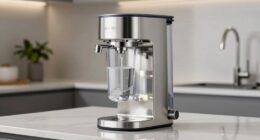Opened apple juice is good for about 7 to 10 days in the fridge if you store it properly. Make sure to keep it sealed after pouring to maintain its freshness. If you leave it at room temperature, it can spoil faster. Always check for signs of spoilage like off-odors or a cloudy appearance. Keeping an eye on how your juice looks and smells is vital. There's more to know about storing apple juice effectively.
Key Takeaways
- Opened apple juice lasts about 7 to 10 days in the fridge when properly stored.
- Canned apple juice also remains good for up to one week after opening.
- Always refrigerate apple juice immediately after opening to maintain freshness.
- Signs of spoilage include off-odor and a cloudy appearance; discard if noticed.
- Unopened apple juice can be kept in the pantry for 6 to 9 months.

Have you ever wondered how long apple juice stays fresh in your fridge? If you've just cracked open a carton of store-bought apple juice, you might be curious about its shelf life. Opened apple juice generally lasts for about 7 to 10 days when stored in the refrigerator. This timeframe can help you plan how to enjoy your juice without worrying about spoilage.
When you open a carton or bottle of apple juice, it's important to store it correctly. Keeping it sealed and refrigerated is key to maintaining freshness. If you leave it out at room temperature, you increase the risk of spoilage significantly. A sealed container can help prevent contamination from bacteria, which can lead to a shorter shelf life. So, always remember to tightly seal your apple juice after pouring it to keep it fresh for as long as possible.
If you're using canned apple juice, the rules are similar. Once you've opened it, it generally remains good for up to one week when refrigerated. It's convenient to have canned juice on hand, but make sure to check the seal. If it's been improperly sealed or stored, you may need to toss it out sooner than expected.
As you store your apple juice, keep an eye out for signs of spoilage. If you notice any off-odor or a cloudy appearance, it's a clear indicator that your juice has gone bad. Trust your senses; if something seems off, it's better to err on the side of caution and dispose of it. Spoilage can occur even within the recommended timeframe, especially if the juice hasn't been stored correctly.
Now, what about unopened apple juice? When it’s still sealed, you can keep it in your pantry for 6 to 9 months. If you prefer to store it in the fridge, it can last up to 9 to 12 months past the label date. However, always check the expiration date on the packaging, as it’s a good guideline for freshness. Once you’ve opened it, though, remember that the clock starts ticking. After opening, you can typically keep apple juice in the refrigerator for about 7 to 10 days, but its flavor and quality may begin to decline before then. To ensure you enjoy the best taste, it’s advisable to consume it within this timeframe, even if it doesn’t show any visible signs of spoilage. If you’re curious about how long apple juice lasts postexpiration, it’s wise to rely on your senses—if it smells off or tastes unusual, it’s better to err on the side of caution and discard it.
To maximize the freshness of your apple juice, always store it in the fridge after opening. The lower temperature helps slow down the growth of any microorganisms that could lead to spoilage. So, if you find yourself with some leftover juice after a family gathering or a refreshing drink on a warm day, you can feel good knowing you've got a little time to enjoy it.
In short, keep your opened apple juice sealed and refrigerated for the best chance of it lasting 7 to 10 days. Pay attention to any signs of spoilage, and don't hesitate to toss it if you're unsure. Enjoy your apple juice while it's fresh, and you'll always have a delightful, crisp taste at your fingertips!
Frequently Asked Questions
Does Apple Juice Go Bad in the Refrigerator?
Yes, apple juice can go bad in the refrigerator. Even when stored properly, it won't last forever.
You should always check for signs of spoilage like off odors or cloudiness before drinking it. If it's been opened, it typically lasts about a week or so.
To keep it fresh, make sure you seal the container tightly after each use. Always trust your senses to determine if it's still good to drink!
How Long Does Opened Bottled Juice Last in the Fridge?
Ever wondered how long your refreshing juice stays good after you crack it open?
Once you open a bottle of juice, it'll typically last about 7 to 10 days in the fridge.
To keep it fresh, make sure you seal it tightly after each pour.
Always check for signs of spoilage, like off odors or changes in appearance.
Enjoy your juice within that timeframe to ensure the best flavor and safety!
How Long Is Martinelli's Apple Juice Good for Once Opened?
Once you've opened Martinelli's apple juice, you should aim to drink it within 7 to 10 days for the best taste and quality.
Store it in the fridge, keeping it tightly sealed in its original container or an airtight one. Since this juice doesn't have preservatives, it can spoil faster than some other brands.
Always check for any signs of spoilage, like unusual odors or cloudiness, before enjoying it.
Is It Okay to Drink Old Apple Juice?
If you're wondering whether it's okay to drink old apple juice, trust your senses.
Check for any off odors, cloudiness, or a vinegar-like taste. If you notice any of these signs, it's best to toss it out.
Even if the juice is past its expiration date, it might still be safe if it looks, smells, and tastes normal.
Always prioritize safety and avoid consuming anything that seems questionable.
Conclusion
In conclusion, keeping apple juice fresh is all about storage. If it's unopened, it can last up to a year in the fridge, but once you crack it open, aim to consume it within a week for the best taste. Whether you enjoy it chilled or as part of a recipe, remember that freshness matters. So, savor it, share it, and don't let it linger too long—your taste buds deserve the best!
Cindy thoroughly researches juicing trends, techniques, and recipes to provide readers with practical advice and inspiration. Her writing style is accessible, engaging, and designed to make complex concepts easy to understand. Cindy’s dedication to promoting the advantages of juicing shines through her work, empowering readers to make positive changes in their lives through the simple act of juicing.











